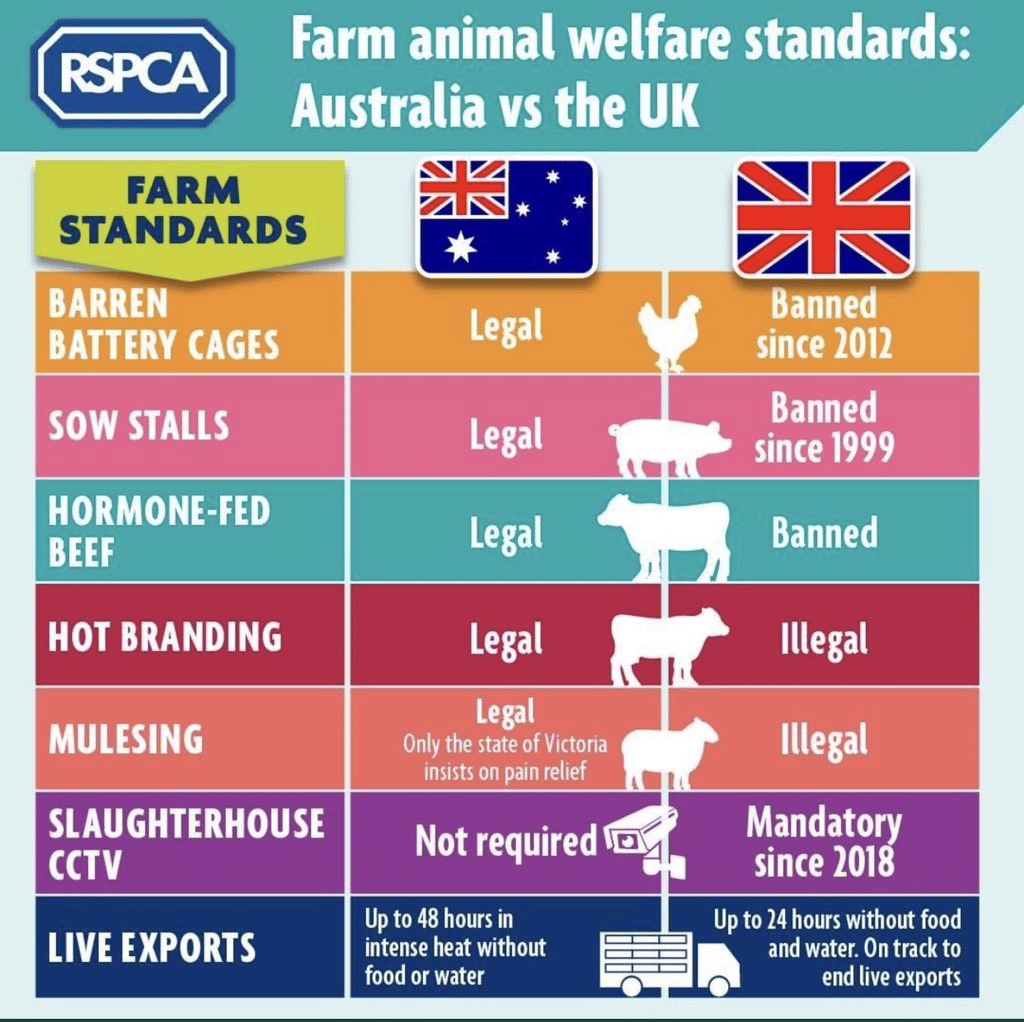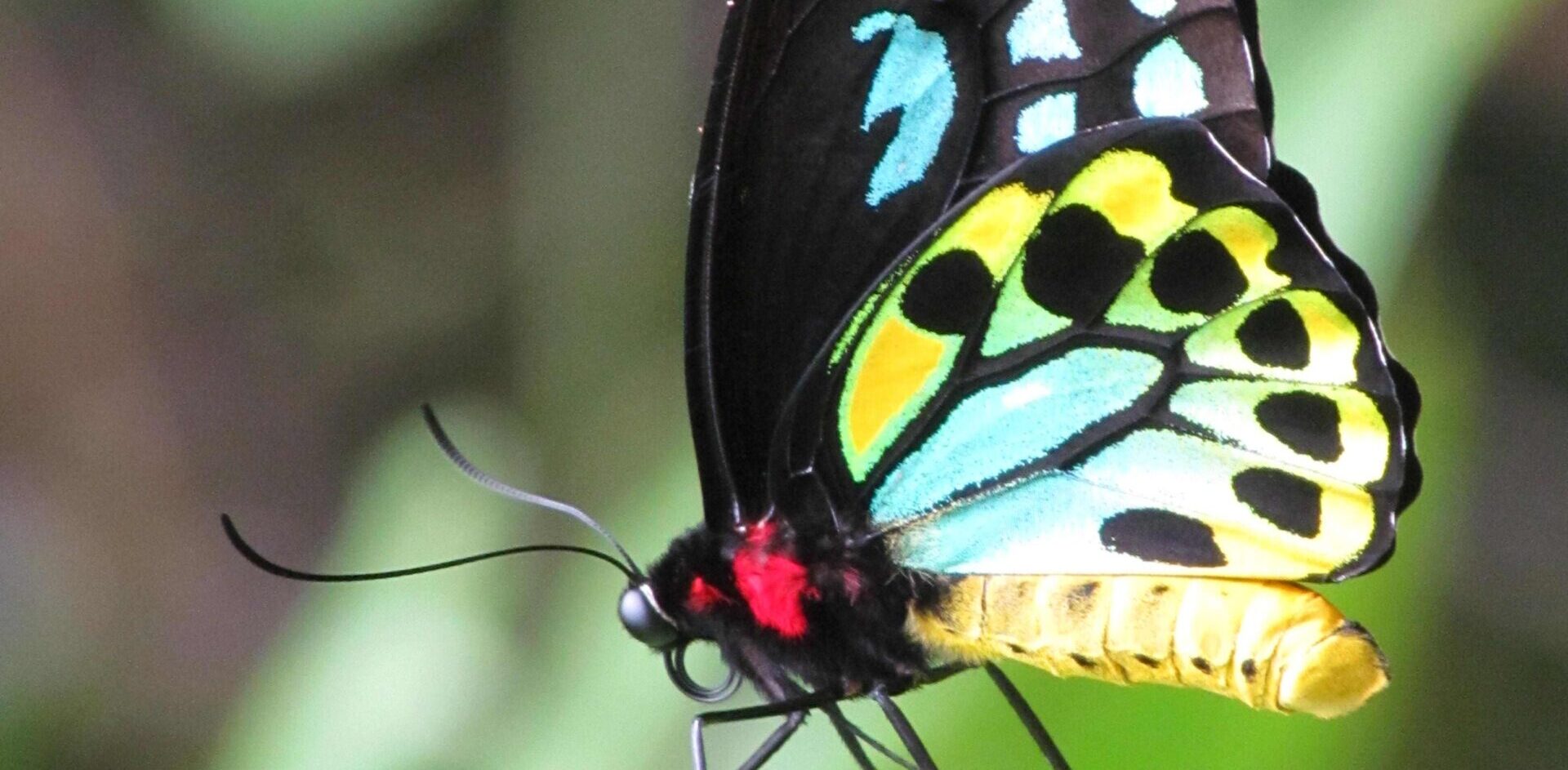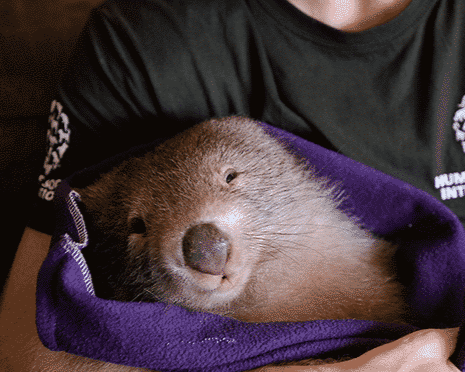The Newsletter of Humane World for Animals' Wildlife Land Trust • Issue 30 • 2025 Read More
Australia and the UK have released the principles that have been agreed for the Free Trade Agreement between the two countries. In what will be a first for Australia, the agreement will include a chapter on animal welfare. This is also expected for the FTA under negotiation between Australia and the EU. That Australia is accepting commitments to animal welfare in its trade relationships is very welcome. There are sentient beings behind the animal products in trade after all. Inevitably, facing up to this has placed an uncomfortable spotlight on Australia’s considerably lower animal welfare standards and shown up our reputation in this policy area.
Australia only scores a D in the Animal Protection Index whereas the UK achieves a more respectable B ranking. Looking at the infographic below from the RSPCA UK you can see exactly why British farmers and animal welfare advocates have been up in arms about the clash of standards between the two countries during the negotiations. In the agreed principles the UK and Australia have committed to establish an Animal Welfare Working Group with the goal of promoting high animal welfare practices. This is excellent and clearly, with the differences between the two countries, there is much to talk about.

Image source: RSPCA England & Wales
Australia clearly needs some incentive to phase out these outdated animal welfare standards, so it is also disappointing to hear that the UK government hasn’t prioritised the upward harmonisation of welfare standards in their negotiations.
British farmers don’t want their produce undercut by animal products produced under lower welfare conditions than is permitted in the UK. Whereas British consumers have been shocked to learn that cruel practices long banned in the UK are still allowed and are even common practice here in Australia. Practices like the brutal mulesing of young Merino lambs – where the skin on their rear is sliced off to create scar tissue to combat flystrike, despite a humane alternative being available. Even more appalling is the fact that our Standards allow mulesing without any pain relief. Who wants that painful history knitted into their woollen jumper. Considering sheep can be bred to be naturally flystrike resistant, producers really should do our country’s reputation a favour (not to mention the poor lambs) and put a stop to it.
Neither is Australia’s reputation served well by a lack of leadership on animal welfare from the federal government. In our federal system the regulation of animal welfare is largely left to state and territory governments and in 2013 the incoming Abbott Government completely vacated the field when it dismantled the frameworks that had at least seen the federal government offer a coordination role for the setting of national animal welfare standards. Australia was marked down in the Animal Protection Index for our lack of national governance and coordination structures, and it certainly leads to a piecemeal and patchwork of standards across the country, incredibly slow to respond to rising public expectations – both the Australian public and those of our trading partners. For heaven’s sake – we are 6 years and counting on negotiations to phase out the use of battery cages for layer hens – a cruel form of confinement that has been banned in the UK since 2012.
Seeking to fill this vacuum in our animal welfare governance, Independent MP Andrew Wilkie has tabled a bill for an Independent Office of Animal Welfare, a proposal also championed by the Australian Greens and that has been in the ALP national platform at various times. An Independent Office for Animal Welfare would see the federal government put in place a much-needed framework to coordinate and drive improvements in national animal welfare standard setting. Sure, the states and territories would continue to be responsible for the compliance and enforcement, but the Commonwealth would coordinate and resource the process for the setting of standards. The standards would be driven by independent science, consulted on fairly, and not held back by undue vested interests. As the free trade negotiations with the UK have shown – we would be better positioned with our trading partners if the federal government invested in improving Australia’s reputation and practice in the treatment of the sentient animals it trades in. An Independent Office of Animal Welfare would be a good start.
Subscribe to stay informed with our regular blogs and campaign updates.
Nicola Beynon is Head of Campaigns for the Australian Office of Humane Society International. She has worked in animal protection for over 25 years championing stronger laws and policies for animals in Australia and at international treaties.


